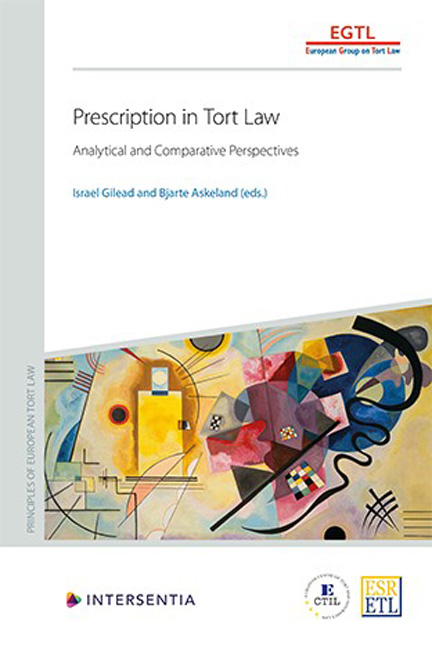Book contents
- Frontmatter
- Dedication
- Acknowledgements
- Contents
- List of Authors
- PART I THEORETICAL AND COMPARATIVE ANALYSES
- Analytical and Comparative Report
- Economic Analysis
- PART II PRESCRIPTION IN TORT LAW OUTLINED
- Case Scenarios
- Austria
- Belgium
- Czech Republic
- England and Wales
- France
- Germany
- Greece
- Italy
- The Netherlands
- Norway
- Poland
- South Africa
- Spain
- Switzerland
- United States
- European Union
- Appendix: Questionnaire
- About the Editors
Greece
Published online by Cambridge University Press: 22 December 2020
- Frontmatter
- Dedication
- Acknowledgements
- Contents
- List of Authors
- PART I THEORETICAL AND COMPARATIVE ANALYSES
- Analytical and Comparative Report
- Economic Analysis
- PART II PRESCRIPTION IN TORT LAW OUTLINED
- Case Scenarios
- Austria
- Belgium
- Czech Republic
- England and Wales
- France
- Germany
- Greece
- Italy
- The Netherlands
- Norway
- Poland
- South Africa
- Spain
- Switzerland
- United States
- European Union
- Appendix: Questionnaire
- About the Editors
Summary
INTRODUCTION
The Greek Civil Code devotes a whole chapter (chapter 10, arts 247– 280 GCC) to prescription and peremption.The provisions on prescription apply to all kinds of claims, unless otherwise provided. More particularly, arts 247– 278 GCC refer to the prescription of claims and arts 279 and 280 GCC to peremption, to which, as art 279 GCC provides, the provisions on prescription also apply by analogy. In contrast to Roman Law, where prescription was an institution of a more general nature, which had as a consequence the acquisition, loss and deactivation of rights due to their exercise or omission to exercise (praescriptio acquisitiva or praescriptio extinctiva), the GCC adopts a narrow notion of prescription and, according to it, only the claim, ie the right to seek a performance from another, consisting of an act or omission, is prescribed (art 247 GCC).
DEFINITION OF PRESCRIPTION
The definition given by the editors of the book, ie that ‘Prescription in tort law is the legal institution that prevents P from enforcing an alleged right against D because of the running of a specified period of time on the tort claim‘also suits the Greek jurisdiction. Accordingly, prescription in tort law, as prescription in general, is the legal institution, according to which a claim can no longer be judicially enforced, because the claimant failed to exercise it within a specific time limit designated by law.
THE NATURE OF PRESCRIPTION AND ITS EFFECTS
According to art 272 § 1 GCC, which also applies to tort claims, when the period of prescription has been completed, the obligor may refuse performance. The claim continues to exist, however, as an imperfect or natural obligation, which means that, as explicitly mentioned in art 272 § 2 sent a GCC, whatever was paid without the knowledge of prescription may not be claimed back.
The lapse of time does not lead to P's claim becoming extinguished, but the latter remains intact. The effect of the prescription is to provide D with a procedural defence that bars P's ability to litigate the right in court.
- Type
- Chapter
- Information
- Prescription in Tort LawAnalytical and Comparative Perspectives, pp. 379 - 412Publisher: IntersentiaPrint publication year: 2020

